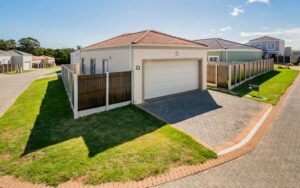Choosing between a freestanding house and a home in a gated community or estate is a major decision when buying or renting property in South Africa. Each option offers unique benefits and potential drawbacks depending on lifestyle preferences, security concerns, budget, and long-term investment goals.
This guide explores the key differences between freestanding homes and gated communities, helping you make an informed decision based on your needs.
What Is a Freestanding House?
A freestanding house is a standalone property on its own land, not within a complex or estate. It offers independence and flexibility, with no shared amenities or communal rules restricting how you use the property.
Key Features of a Freestanding House:
✅ Private land ownership
✅ More space, including a larger yard or garden
✅ Freedom to renovate or expand
✅ No shared facilities or communal rules
What Is a Gated Community?
A gated community or residential estate is a housing development with controlled access, private roads, and shared amenities. Residents benefit from security, shared facilities, and a managed environment, often with a homeowners’ association (HOA) overseeing maintenance and regulations.
Key Features of a Gated Community:
✅ Security-controlled access
✅ Shared amenities like parks, pools, gyms, and clubhouses
✅ Maintenance services included in levies
✅ HOA rules governing property use
1. Security: Which Offers Better Safety?
🏡 Freestanding House:
- Security depends on personal measures such as alarm systems, CCTV, electric fences, and private security services.
- Vulnerable to burglaries if not well-secured.
- No immediate neighbours or patrol services for assistance in case of emergencies.
🏢 Gated Community:
- High-level security with controlled access, 24-hour patrols, electric fencing, and surveillance cameras.
- Less risk of crime and break-ins compared to freestanding homes.
- Some estates offer biometric entry and private emergency response teams.
✔ Winner: Gated communities generally provide superior security, making them ideal for families, retirees, and professionals seeking a safer living environment.
2. Cost Considerations: Which Is More Affordable?
🏡 Freestanding House:
- Lower upfront costs compared to high-end estates.
- No monthly levies, but homeowners are responsible for all maintenance, security, and landscaping costs.
- Unpredictable expenses due to maintenance and repairs.
🏢 Gated Community/Estate:
- Higher initial purchase price, especially in premium estates.
- Monthly levies for security, maintenance, and shared facilities.
- Costs are more predictable as levies cover major upkeep.
✔ Winner: Freestanding houses are generally more affordable in the long run but require individual management of expenses. Gated estates offer predictable costs but often at a premium.
3. Lifestyle & Community: Where Will You Feel More at Home?
🏡 Freestanding House:
- Greater privacy and independence.
- Freedom to host events and modify the property without needing approvals.
- No shared amenities, meaning fewer community interactions.
🏢 Gated Community/Estate:
- Tight-knit community feel, often with social events and resident engagement.
- Access to parks, sports facilities, pools, and clubhouses without needing to maintain them personally.
- Homeowners’ associations enforce rules on noise, renovations, and pet restrictions.
✔ Winner: Gated communities are ideal for families, retirees, and social individuals, while freestanding houses suit those who prefer more privacy and independence.
4. Maintenance & Upkeep: Which Requires Less Effort?
🏡 Freestanding House:
- Owners handle all maintenance, repairs, and landscaping.
- Costs fluctuate depending on wear and tear.
- No restrictions on home modifications or landscaping.
🏢 Gated Community/Estate:
- The HOA or management team handles general maintenance of roads, security, and communal spaces.
- Homeowners may still be responsible for interior and garden maintenance.
- Some estates have strict rules regarding house aesthetics, which may limit personalisation.
✔ Winner: Gated communities reduce maintenance responsibilities, making them ideal for busy professionals or retirees.
5. Investment & Resale Value: Which Is a Better Long-Term Investment?
🏡 Freestanding House:
- Generally offers better land appreciation as owners control the property.
- Higher resale value potential if located in a desirable neighbourhood.
- Market demand fluctuates based on the economy and crime rates.
🏢 Gated Community/Estate:
- Properties in well-managed estates tend to retain or increase value over time due to demand for security and lifestyle amenities.
- Can be easier to resell due to estate reputation and consistent management.
- Monthly levies may discourage some buyers.
✔ Winner: Gated estates often have higher demand and stable resale value, while freestanding homes can appreciate more depending on location and upgrades.
6. Freedom & Customisation: Which Allows More Control?
🏡 Freestanding House:
- Owners can renovate, extend, and modify their property freely.
- No restrictions on home design, pet ownership, or business activities.
🏢 Gated Community/Estate:
- Homeowners must follow HOA rules, which may restrict renovations, paint colours, and landscaping.
- Some estates have strict noise and guest policies.
✔ Winner: Freestanding houses offer full freedom, making them ideal for those who value control over their living space.
7. Family & Retirement Considerations: Which Is More Suitable?
🏡 Freestanding House:
- More space for growing families.
- May require additional security measures.
- Ideal for those who prefer an independent lifestyle.
🏢 Gated Community/Estate:
- Safer environment for children to play freely.
- Popular with retirees due to security, amenities, and maintenance services.
- Family-friendly features like parks and schools within the estate.
✔ Winner: Gated communities provide a family-friendly and retirement-friendly environment with built-in security and lifestyle perks.
Final Verdict: Which Should You Choose?
Choose a Freestanding House If You:
✅ Want full control over your property
✅ Prefer privacy and independence
✅ Don’t want to pay monthly levies
✅ Are willing to handle security and maintenance yourself
Choose a Gated Community/Estate If You:
✅ Prioritise security and a community-oriented lifestyle
✅ Want access to shared amenities without personal maintenance
✅ Prefer stable resale value with managed estate upkeep
✅ Enjoy a structured living environment with enforced rules
Frequently Asked Questions
Is a freestanding house cheaper than a home in a gated estate?
Generally, freestanding homes have lower initial costs and no levies, but you’ll pay more for security and maintenance. Gated estates offer shared costs but require monthly fees.
Are gated communities safer than freestanding houses?
Yes, gated communities have controlled access, CCTV, and security patrols, making them safer than most freestanding homes.
Do gated estates allow pets?
Some estates have pet restrictions, so always check HOA regulations before moving in with pets.
Which is better for families?
Gated estates often provide secure play areas, schools, and recreational facilities, making them a better fit for families.
Are freestanding houses harder to sell?
It depends on the area. Well-located freestanding homes appreciate well, while gated estates often have steady demand due to their amenities and security.
Conclusion
The decision between a freestanding house and a home in a gated community/estate ultimately depends on your lifestyle, security preferences, budget, and investment goals.
If you value freedom and space, a freestanding house may be best. If security, convenience, and community living appeal to you, a gated estate could be the right choice.
📍 Looking for the perfect home in South Africa? Browse listings for both freestanding houses and gated communities at Propertify.co.za today!
Anele and the Club Discusses Freestanding vs Gated Estates
To gain further insights into this debate, watch this discussion by 947 Joburg, where they break down the pros and cons of both property types.







